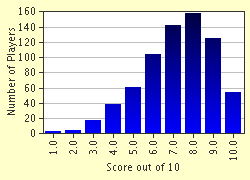Quiz Answer Key and Fun Facts
1. He wrote the best of books, he wrote the worst of books, he imparted wisdom, he dispensed foolishness, we have devoured his books for pleasure, we have ploughed through them for classes - in short his books are so far like our own lives that literary authorities find difficulty unraveling them.
Who is this Victorian author, who is, for so many, the best of authors or the worst of authors?
2. If you don't know about Tom and Huck, you probably ain't never read Sam's books. And that means you're hardly sivilized even if you are respectable and that's not stretching the truth too much. Like ol' Jim said, "I tole you, doan' talk to me bout bein' learn'd till you read dis man's books."
Which author are we being exhorted to read?
3. "What's the Catch?" asked the New York Times.
"The best there is." agreed the public.
"Orr?" asked Yossarian.
"Sweden," confided the Chaplain.
And it was love at first sight.
In 1961, which of the following authors published a book that might have contained the dialogue above?
4. He was an aging man who drank alone, and he had received numerous electroconvulsive shock treatments without curing his depression. But after so many treatments, his memory was damaged, the worst form of damage for an author. Hefting his shotgun, he placed it against his head and ended his most permanent defeat.
Which author best matches this passage in style and substance?
5. O' thou vile faithless dishonest wretch! Will thou make cowardly pretense to need four bull-pizzling choices to identify whose style this elf-skinned, sodden witted quiz making hedge pig is trying to imitate? Just fill in the pribbling blank with my name.
6. And so, having concluded Jane's story, in which Thornfield figured so prominently, the reader might ask what my own birth in Thornton, Yorkshire, England might signify: for surely, the book itself does not address this question. I assure you, dear reader, that such seeming coincidences are not accidental. In my youth, my own dear sister succumbed to the same wasting disease that Jane's dear friend Helen did; though my sister's death came after escaping the harsh conditions at Clergy Daughters' School at Cowan Bridge, Lancashire, England, a dismal school whose conditions paralleled those Jane experienced at Lowood School.
Which author included autobiographical details in her story about Jane and Mr. Rochester?
7. The apparition made a poor attempt at nonchalance as he held the hourglass up to the light. "IF YOU HAVE NOT YET READ THIS AUTHOR, YOU MIGHT WANT TO DO IT SOON," he advised.
Which author are you being admonished to read?
8. It is melancholy to traverse the rows of cubicles and observe the hunched bodies and gaunt empty expressions of computer users. And yet, I have been assured by a knowing engineer from England that the energy released on combustion of several thousand of these unfortunates might provide light and heat for hundreds of souls for days. And so I offer this modest proposal ...
Which of the following authors seems most likely to propose ending the misery of cubicle workers in the fashion hinted at above?
9. "What sort of people did he amuse and why cucumber sandwiches?"
"My dear fellow, he wrote of sandwiches and champagne, confused identities and love. He employed wit and wordplay, and pointed counterpoint - but explained all in the end." Who could fail to be amused?"
"A delicious sort of Bunburyism, I suppose."
"And all in complete earnest."
Which of the following playwrights seems most likely to have written dialogue such as that above?
10. Beginning some time before the War, but not finishing until sometime after, there lived by the banks of the river Isis on the campus of Oxford a silver-tongued and nimble-minded professor of Anglo-Saxon who wrote of the brave adventures of little people and their involvement in matters of the great and wise; and of a certain object of great power, the longing for which drove even the wise to deeds both fell and rash.
To which of the following authors should this passage give you an "Inkling"?
Source: Author
uglybird
This quiz was reviewed by FunTrivia editor
agony before going online.
Any errors found in FunTrivia content are routinely corrected through our feedback system.

